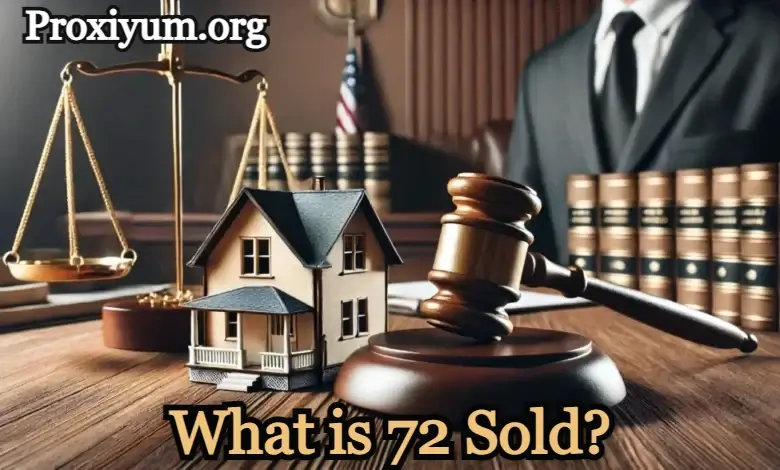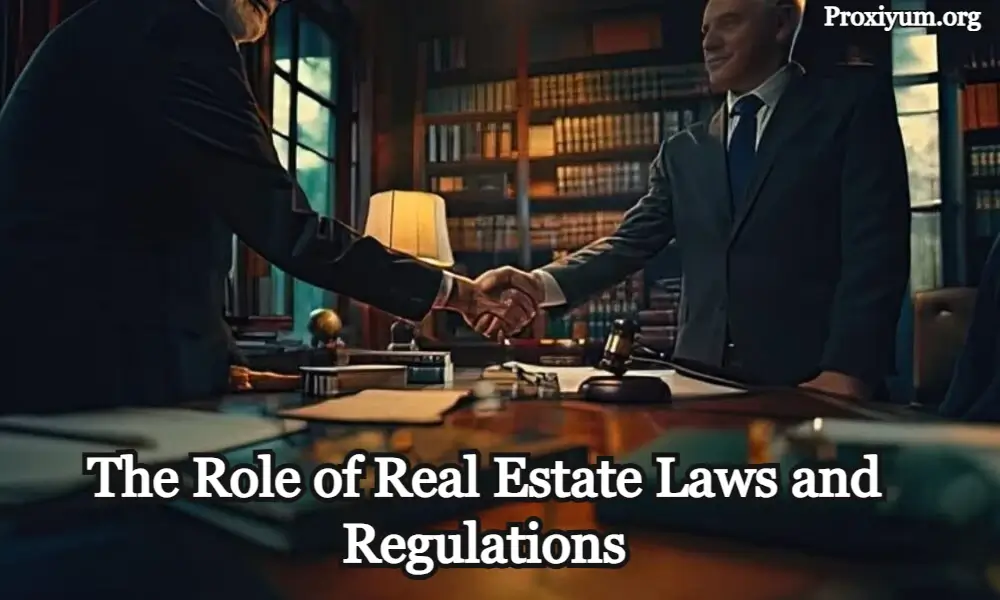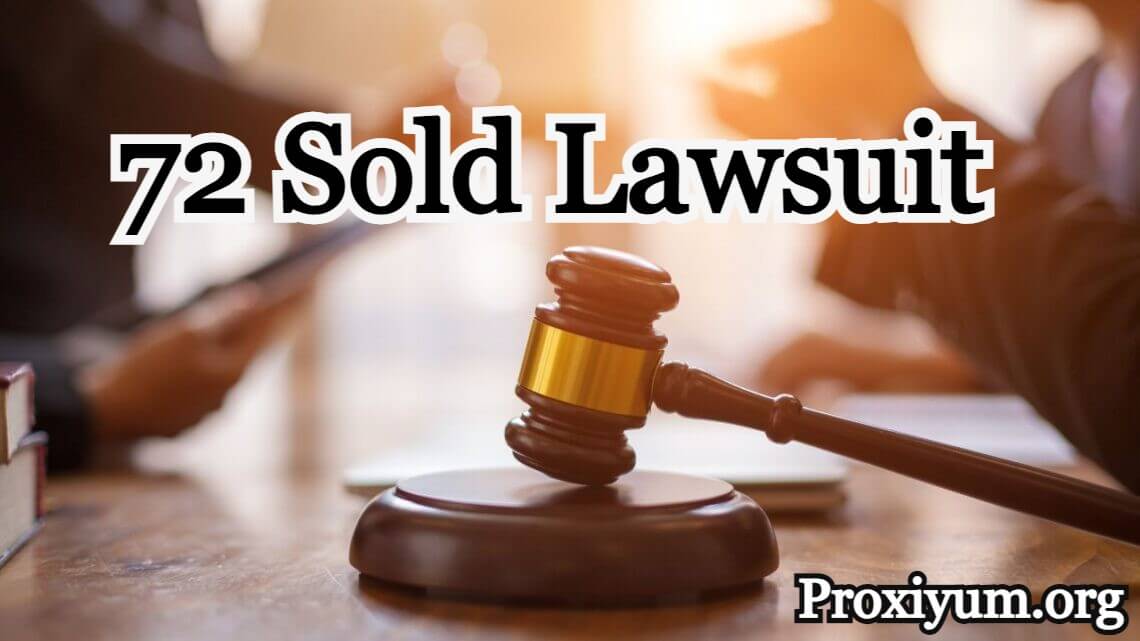Introduction
The real estate world was shaken when 72 Sold, a popular home-selling service, faced a lawsuit that questioned its business practices.
For those unfamiliar, 72 Sold offers a unique home-selling process that promises to sell homes in just 72 hours.
But with growing popularity came scrutiny, and now, the company finds itself embroiled in a legal battle.
What went wrong, and what does this lawsuit mean for the future of 72 Sold? Let’s dive deep into the details.
What is 72 Sold?


72 Sold was founded with the mission to revolutionize how homes are sold. Traditional home sales can take weeks or months, but 72 Sold aimed to cut down the time dramatically by offering a streamlined, 72-hour selling process.
Overview of the 72-Hour Home Selling Process
The company’s promise is simple: list your home, market it aggressively, and sell it within 72 hours. By focusing on a fast-paced marketing strategy and pre-qualified buyers, they aimed to provide homeowners with a quicker, hassle-free selling experience.
Popularity and Rise in the Real Estate Market
It didn’t take long for 72 Sold to gain traction. Homeowners who were looking to avoid the lengthy and uncertain traditional selling process saw it as a golden opportunity. Soon, the company was a major player in various markets, attracting more attention from both customers and competitors.
The Lawsuit: An Overview
Key Details of the Lawsuit
The lawsuit against 72 Sold alleges that the company engaged in questionable practices, raising concerns over its business model. The specifics of the legal complaint revolve around several key areas, including false advertising and breach of contract.
Parties Involved
The legal battle involves homeowners who claim to have been misled by the company’s advertising and contractual promises. Additionally, there may be regulatory bodies involved, examining whether 72 Sold violated any industry standards or laws.
Allegations Against 72 Sold
The plaintiffs argue that 72 Sold’s promise of selling homes in 72 hours was not always fulfilled and that the company engaged in deceptive marketing practices. Some homeowners also allege that the terms of service were unclear, leading to confusion and dissatisfaction.
Why Was 72 Sold Sued?
False Advertising Claims
At the heart of the lawsuit is the accusation of false advertising. The plaintiffs claim that the promise of a 72-hour home sale was not a guarantee, and in some cases, homes remained on the market far longer. This has led to complaints from homeowners who felt misled by the company’s aggressive marketing.
Breach of Contract Allegations
Another aspect of the lawsuit involves allegations of breach of contract. Some homeowners argue that the terms of their agreements with 72 Sold were not honored, further complicating their sales process.
Regulatory Violations
There is also a focus on whether 72 Sold violated any real estate laws or regulations, especially in how they conducted their business and marketed their services.
The Role of Real Estate Laws and Regulations


Important Real Estate Laws in the U.S.
Real estate laws are designed to protect both buyers and sellers, ensuring transparency and fairness in transactions. These laws cover everything from advertising to contracts and disclosures.
How These Laws Apply to Companies Like 72 Sold
For a company like 72 Sold, adhering to real estate regulations is critical. The lawsuit suggests that 72 Sold may have skirted some of these laws, particularly in how it advertised its services and handled contracts with homeowners.
Impact of the Lawsuit on 72 Sold’s Reputation
Public Perception Before and After the Lawsuit
Before the lawsuit, 72 Sold enjoyed a largely positive reputation. Many homeowners praised the company for its fast service. However, the lawsuit has cast a shadow on this reputation, with potential clients now questioning whether they can trust the company’s promises.
Trust Issues Among Potential Clients
The allegations of false advertising and breach of contract have made some potential clients wary. For a company that relies on trust and quick sales, this lawsuit could have long-lasting effects on customer confidence.
The Response from 72 Sold
Company’s Statement on the Lawsuit
72 Sold has publicly denied the allegations, stating that they have always operated within the bounds of the law. They argue that the lawsuit is an isolated incident and does not reflect the experiences of the majority of their clients.
Steps They Took to Address the Allegations
The company has also taken steps to clarify their advertising and contracts, ensuring that potential clients fully understand the terms of service before agreeing.
What’s at Stake for 72 Sold?
Financial and Operational Impact
If the lawsuit results in a significant financial settlement, it could have serious implications for 72 Sold’s operations. The company may be forced to change its business model, or even shut down in certain markets.
Potential Damage to Partnerships
Beyond the financial impact, the lawsuit could strain 72 Sold’s relationships with key partners, including real estate agents and marketing firms. These partnerships are crucial to the company’s success, and any damage here could have long-term consequences.
How This Lawsuit Affects Home Sellers
Concerns Among Homeowners Using or Considering the Service
For homeowners currently using 72 Sold or considering it, the lawsuit raises concerns. Will the company be able to deliver on its promises? Can homeowners trust that their contracts will be honored?
Trust in the 72-Hour Selling Process
The lawsuit also calls into question the reliability of the 72-hour selling process. Homeowners may now be more skeptical of this promise, leading them to explore other options.
Comparing 72 Sold to Other Real Estate Services


Traditional Home Selling vs. 72 Sold
In comparison to traditional home selling methods, 72 Sold offers a much faster process. However, the lawsuit may lead homeowners to reconsider whether speed is worth the potential risks.
How Competitors Might Capitalize on the Lawsuit
Competitors in the real estate market may use this lawsuit as an opportunity to attract dissatisfied 72 Sold clients. By offering more transparent and reliable services, they could gain an edge in the market.
Lessons for Other Real Estate Companies
Importance of Transparency
One key takeaway from this lawsuit is the importance of transparency in advertising and contracts. Real estate companies must ensure that their clients fully understand the services being offered.
Avoiding Legal Pitfalls in Advertising and Contracts
This lawsuit serves as a reminder of the legal pitfalls that can arise when a company fails to clearly communicate its terms. Other real estate companies would do well to learn from 72 Sold’s mistakes.
Expert Opinions on the 72 Sold Lawsuit
Insights from Legal and Real Estate Experts
Legal and real estate experts have weighed in on the case, offering insights into its potential outcome. While some believe that 72 Sold will settle, others predict that the company may face significant penalties if found guilty.
Predictions on the Lawsuit’s Outcome
While it’s too early to predict the exact outcome, most experts agree that the lawsuit will have long-lasting effects on 72 Sold’s business, regardless of the final verdict.
The Future of 72 Sold
What the Company’s Future Might Look Like Post-Lawsuit
If 72 Sold can weather the storm, it may emerge stronger by adopting more transparent practices. However, the lawsuit could also force the company to scale back its operations or change its business model entirely.
Potential Changes to Their Business Model
To avoid future legal issues, 72 Sold may need to adjust its advertising and contract practices, ensuring that all promises made to homeowners are realistic and legally sound.
Conclusion
The 72 Sold lawsuit has sent ripples through the real estate industry, highlighting the importance of transparency and ethical practices in home sales.
While the outcome remains to be seen, this legal battle has already had a significant impact on 72 Sold’s reputation and operations.
Whether the company can recover and regain the trust of homeowners will depend on how they respond to the allegations and adapt their business practices.
